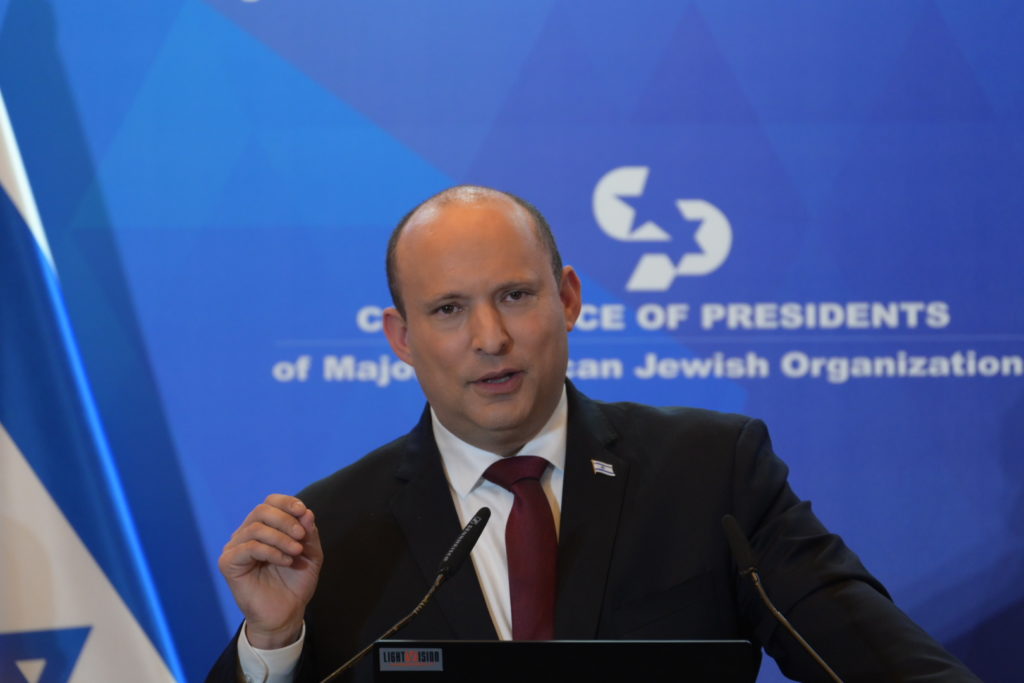
With a revived nuclear deal between Iran and the major world powers possibly in sight, Israel is warning the new deal may only provide two-and-a-half years of restrictions on Iran’s nuclear program—in exchange for billions of dollars. Israeli Prime Minister Naftali Bennett on Sunday said that when the deal expires, due to so-called “sunset” clauses, Iran will be able to have an advanced nuclear fuel program and a key step towards developing nuclear weapons.
“The single biggest problem with this deal is that in two-and-a-half years, which is right around the corner, Iran will be able to develop, install and operate advanced centrifuges,” said Bennett in a speech, which was also published by his office. “Imagine football stadiums of advanced centrifuges spinning—allowed by this agreement.”
Bennett, speaking to the Conference of Presidents of Major American Jewish Organizations, said that in exchange for just that short window of time, Iran would get “billions of dollars in frozen assets and access to the booming energy market.”
“Much of this money will be funneled towards attacking Israel,” warned Bennett.
The short duration of restrictions is triggered by the original nuclear deal signed in 2015, the Joint Comprehensive Plan of Action (JCPOA). At the time, the deal included a 10-year sunset clause on certain key nuclear restrictions for Iran. This was a concern to Israel and later to former United States President Donald Trump, who eventually pulled the US out of the JCPOA and reinstituted major sanctions on Iran. In response, Iran withdrew from certain commitments under the JCPOA, making disturbing advances in their nuclear program, including nuclear fuel enrichment that goes beyond reasonable civilian use.
However, the world powers seem intent on resuscitating the JCPOA with Iran instead of starting over with a new deal. What’s more, Bennett is concerned they would retain the old JCPOA restriction timeframes, leaving just two-and-a-half years of the original 10 years left for key restrictions.
Bennett, in his speech on Sunday, said such an agreement “leaves Iran with a fast track to military-grade enrichment. And in the time until it sunsets, they won’t even have to destroy all those centrifuges they developed over the past few years.”
Furthermore, Bennett said that as part of the negotiation, Iran wants to close its open files with the International Atomic Energy Agency nuclear watchdog, which he noted are “‘hot investigations’ pertaining to possible military dimensions.”
“Or in simple English: Iran has hidden and is still hiding nuclear-weapon related materials. It has been caught red-handed, and Iran is demanding that the inspectors that caught them will pretend to forget what they saw.”
In exchange for limited restrictions on Iran’s nuclear program, they would receive significant sanctions relief, which Bennett noted would result in money spent on terrorism and attacks on Israel and their allies. In addition, Bennett said Iran wants their Islamic Revolutionary Guard Corps to be delisted as a terror group.
“For Israel and for all the stability-seeking forces in the Middle East, the emerging deal is likely to create a more violent and less stable Middle East,” said Bennett. “While there is no doubt that America is our biggest and strongest friend, ultimately it is us who live in the region, and it is us who will bear the consequences.”
Despite his concerns, Bennett said that Israel’s position on a deal is “not automatic. We are not against any deal per se,” indicating they are only opposed to an insufficient deal. The Israeli leader said he will continue to work with the world on the Iran conflict, including meeting with dozens of elected US officials this week. Regarding US President Joe Biden, who was in the Obama Administration who signed the original JCPOA and whose government been working to restore the nuclear deal with Iran, Bennett noted that “despite the differences we have on this agreement, our relations with our friend President Biden and his administration, will remain close and strong.”
Regardless of what the world powers do in the nuclear negotiations with Iran, Bennett insisted Israel will address the nuclear threat from Iran on their own if needed.
“There are challenges, but we are up to them. Let me be clear: Israel won’t accept Iran as a nuclear threshold state,” said Bennett. “We have a clear and un-negotiable red line: Israel will always maintain its freedom of action to defend itself…
“We will continue to focus on Israel’s security. We will say, and more importantly do—everything necessary to ensure it.”
(By Joshua Spurlock, www.themideastupdate.com, February 20, 2020)
